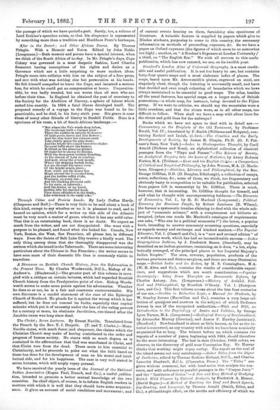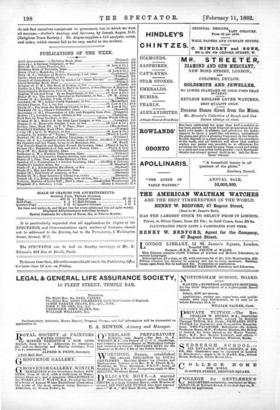Stanford's London Atlas of Universal Geography is a most credit-
able and useful publication. It is not too heavy to use, but contains forty-four quarto maps and a most elaborate index of places. The maps, based upon Mr. Arrowsmith's plates, engraved on steel, are singularly clear, though the lettering is necessarily small, and have that decided and even rough colouring of boundaries which we have always maintained to be essential to good maps. The atlas, besides all the usual features, has special maps, on a larger scale, of British possessions,—a whole map, for instance, being devoted to the Fijian group. If we were to criticise, we should say the mountains were a little overdone, and that the rivers were, as iu all other maps, too difficult to follow. When shall we have a map with silver lines for the rivers and gold lines for the railways ?
Books which we have not space to deal with in detail are :— Commentary on the Prophets of the Old Testament, by Professor Ewald, Vol. IV., translated by F. Smith (Williams and Norgate), con- taining Ezekiel and Isaiah, xl.-lxvi.—The Creation and the Early Developments of Society, by James H. Chapin, Ph.D. (G. P. Pat- natn's Sons, New York.)—Index to Shakesperian Thought, by Cecil Arnold (Dickens and Sons), an alphabetical collection of classical passages from the "Plays and Poems."—The Science of Beauty, an Analytical Enquiry into the Laws of .rEsthetics, by Avary Holmes Forbes, M.A. (Tritbner.—Kant and his English Critics : a Comparison ' of Critical and Empirical Philosophy, by John Watson, M.A. (J. biacle- hose, Glasgow.)—Sketches, Literary and Philosophical, by the Rev. George Gilfillan, D.D. (D. Douglas, Edinburgh), a collection of essays, notes, reflections, &c., some of them, we think, too fragmentary and obviously hasty in composition to be suitable for publication, selected from papers left in manuscript by Dr. Gilfillan. There is much, however, that is interesting. Dr. Gilfillan thought for himself, and said what he thought with uncompromising boldness.—The Elements of Economics, Vol. I., by H. D. Macleod (Longman) ; Political Economy for Business People, by Robert Jamieson (E. Wilson), the former a systematic treatise claiming to deal with the whole sub- ject of "economic science," with a completeness not hitherto at- tempted, (when one reads Mr. Macleod's catalogue of requirements one asks, " Who can be a political economist ?") the latter, a popular book, intending to answer commonly occurring questions, especially as regards money and exchange and kindred matters.—The Popular Educator, Vol. I. (Cassell and Co.), is a "new and revised edition " of a well-known work, which has had no inconsiderable success.—Indcat Geographicus Indicus, by J. Frederick Banen (Stanford), may be described as an Indian gazetteer, containing, as it does, " a list, alpha-
betically arranged, of the principal places in her Imperial Majesty's Indian Empire." The area, revenue, population, products of the various provinces and States are given, and there are many illustrative maps.—British India and its Rulers, by H. S. Cunningham, M.A. (W. H. Allen and Co.), contains the results of considerable experi- ence, and suggestions which are worth consideration.—Popular Sovereignty : being Some Thoughts on Democratic Reform, by Charles Antony, Jun. (Longmans.)—History of Irelarid, Poli- tical and Philosophical, by Standish O'Grady. Vol. I. (Sampson Low, and Co.) This first volume covers about the first four centuries of our era.—Studies in Deductive Logic, a Manual for Students, by W. Stanley Jevons (Macmillan and Co.), contains a very large col- lection of questions and answers in the subj ect of which Professor Jevons is one of the recognised authorities.—Wish and Will, an Introduction to the Psychology of Desire and Volition, by George Lyon Turner, M.A. (Longmans.)—Geological Survey of Newfoundland, by Alexander Murray (director), and James P. Howley (assistant).
(Stanford.) Newfoundland is about as little known, as far as the in- terior is concerned, as any country with which we have been nominally acquainted for so long. The volume before us, which contains the reports of a number of years, beginning with 1864, should therefore be the more interesting. The last in date (October, 1880) refers, we observe, to the discovery of gold near Conception Bay. Mr. Murray thinks that working might repay outlay. The report on the coal of the island seems not very satisfactory.—Select Titles from the Digest of Justinian, edited by Thomas Erskine Holland, D.C.L., and Charles
Lancelot Shadwell, B.C.L. (Clarendon Press.) The " Titles " are given without comment, but with head-notes that analyse the con-
tents, and with reference to parallel passages in the "Corpus Jaria " and the " Institutes of Gaius."—A New and Easy Method of Studying British Wild Flowers by Natural Analysis, by Frederick A. Messer.
(David Bogue.)-4. Method of Teaching the Deaf and Dumb Speech, Lip-Reading, and Language, by Thomas Arnold (Smith, Elder, and Co.), a philanthropic effort, on the merits and efficiency of which we
do not feel ourselves competent to pronounce, but to which we wish all snecess.—Butler's Analogy and Sermons, by Joseph Angus, D.D. (Religious Tract Society.) Dr. Angus supplies a fall analysis, notes, and index, which cannot fail to be very useful to the student.















































 Previous page
Previous page